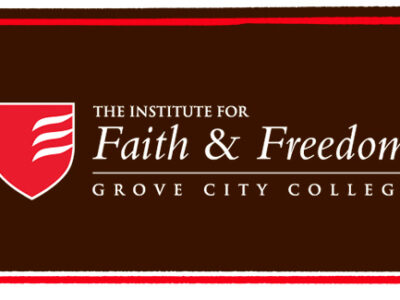In 2005, the Center for Vision and Values hosted a conference about poverty in the United States and different approaches to alleviating it. During the Q&A session after one of the presentations, a Grove City College student asked what actions the College was taking to help the poor. Good question. While the short answer is, “More than you realize,” I hope the student asked himself the far more important question, “What am I going to do about poverty?”
I don’t think there is anybody in America—liberal or conservative, atheist or Christian—who thinks that poverty is a good thing or wouldn’t like to see poverty vanquished. Differences of opinion emerge when the talk turns to strategies. Liberals tend to favor government programs that use tax dollars—monies that are taken by compulsion—to fund various government antipoverty programs. Libertarians favor, and most conservatives tend to favor, private-sector initiatives that are funded by voluntary contributions. Liberals are happy to give money to this, that, and the other cause, as long as it is other people’s money. I call this “the liberal temptation.” Conservatives and libertarians are more likely to acknowledge that they have a personal responsibility to freely contribute time or money to work toward the desired goal. There’s a huge difference between compelling others to perform work you think is important and doing good deeds yourself.
Christians who happen to be political liberals are fond of citing scriptural verses exhorting believers to perform charitable deeds. Indeed, there are many such verses, and they mean what they say. But what the liberals invariably fail to see is that the Bible never indicates that it is the Christian’s duty to compel others to do charitable works; rather, Christians themselves are expected to do those works. There is no charity by proxy in the Bible. True charity comes from an inner, spiritual impulsion, not from outward political compulsion. That is the essential difference between Caesar and Christ.
The liberal approach to poverty is also rendered problematical by their anti-capitalist, anti-business mentality. Liberals regard themselves as the good guys for initiating government programs to help Americans of modest means, while disdaining businessmen as selfish, less-than-moral beings who are engaged in the selfish and morally inferior pursuit of profits. This is an unduly harsh assessment of businessmen; in fact, it is spectacularly ignorant and perversely unfair. A person may not like the daily tussle of business or individual businesspersons who behave abusively, and they are fully justified in being repulsed by illegal conduct. However, there is a vital historical fact that anti-business liberals generally overlook: business’ role in reducing poverty.
Throughout most of human history, the masses of human beings were wretchedly poor. Only in the last few centuries have large numbers of people climbed out of poverty. What has been the agent of such a fundamental change? Profit-seeking business. Since the dawn of the Industrial Revolution, business has lifted more people out of poverty than all the churches, charities, and government programs (national or multilateral—like the World Bank) combined. Look at the history of Great Britain, the United States, Japan, Hong Kong, Singapore, Chile, South Korea, and now China and India. Wherever you look, standards of living rise where business is allowed to flourish.
So, what is Grove City College doing to aid the poverty-stricken? Nothing directly. After all, it is a college, not a charity. Grove City would be deceiving its customers if it charged them for a high-quality education, and then diverted a portion of tuition fees to non-educational programs. Indirectly, however, it’s a very different story. Unlike most colleges, Grove City energetically upholds, defends, and promotes the free-enterprise system that is the key to reducing poverty on earth. It educates its students about pressing issues like poverty so that they are equipped to make informed, helpful choices in addressing those problems. It inculcates Christian values, such as having compassion and charity for our fellow man, and encourages students to find their own individual ways to express that care. In response to the young man’s question, I would say, “Grove City College is doing all that it can reasonably be expected to do. Now look in the mirror and ask yourself if the same can be said about you.” And beware the liberal temptation.



